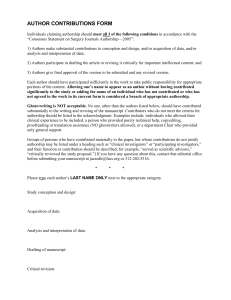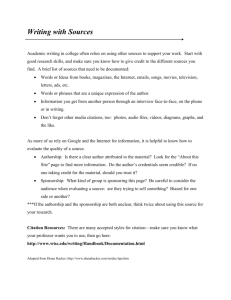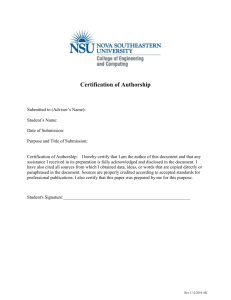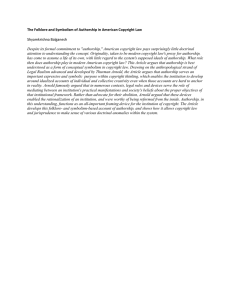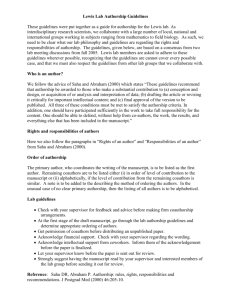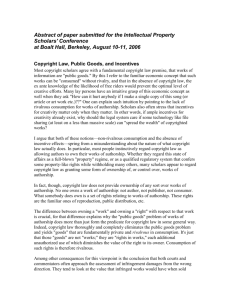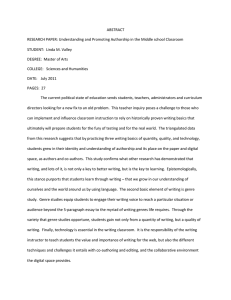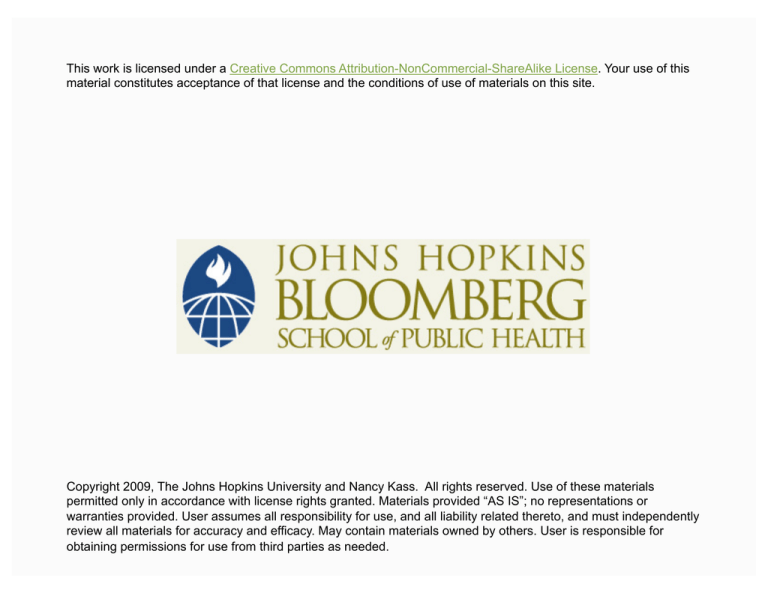
This work is licensed under a Creative Commons Attribution-NonCommercial-ShareAlike License. Your use of this
material constitutes acceptance of that license and the conditions of use of materials on this site.
Copyright 2009, The Johns Hopkins University and Nancy Kass. All rights reserved. Use of these materials
permitted only in accordance with license rights granted. Materials provided “AS IS”; no representations or
warranties provided. User assumes all responsibility for use, and all liability related thereto, and must independently
review all materials for accuracy and efficacy. May contain materials owned by others. User is responsible for
obtaining permissions for use from third parties as needed.
Section E
Authorship
Who Gets To Be an Author?
What does authorship mean?
What have people said about the topic.
Case examples.
3
Guidelines
Uniform requirements for manuscripts submitted to biomedical
journals—writing and editing for biomedical publications
- “Authorship credit should be based on the following:
1. Substantial contributions to conception and design, or
acquisition of data, or analysis and interpretation of data;
2. Drafting the article or revising it critically for important
intellectual content; and
3. Final approval of the version to be published
- Authors should meet conditions 1, 2, and 3.”
Source: www.ICMJE.org
4
Guidelines
“Acquisition of funding, collection of data, or general supervision of
the research group, alone, does not justify authorship.”
“Each author should have participated sufficiently in the work to
take public responsibility for appropriate portions of the content.”
Source: www.ICMJE.org
5
Ashton Business School Policy Document
“‘Substantial contribution’ refers to intellectual contribution to a
project and/or writing such as formulation of research ideas;
research design; major analysis; interpretation of findings and
theoretical development. ‘Intellectual contribution’ does not
necessarily refer to input of time, methodological advice, or to
the carrying out of technical tasks such as literature review, data
collection, data analysis or editing.”
—Ashton Business School Policy Document, 2006
6
JAMA Guidelines
To qualify for authorship, you must check at least one box for each of the three
categories of contributions listed below
I have made substantial contributions to the intellectual content of the paper as
described below . . .
1.
2.
3.
Check at least one of the three below
Conception and design
Acquisition of data
Analysis and interpretation of data
Check at least one of two below
Drafting of the manuscript
Critical revision of the manuscript for important intellectual content
Check at least one below
Statistical analysis
Obtaining funding
Administrative, technical, or material support
Supervision
No additional contributions
Other (specify)
7
Guest/Honorary Authorship
Inclusion of someone with minimal scientific contribution as a
tribute or compensation for service
Ghost authorship
- Someone who wrote the article or had significant scientific role
is not included
8
Prevention of Authorship Disputes?
Discuss authorship ahead of time (including order of authors)
9
Survey Vignettes
Drafts lit review; some sentences used in final manuscript
Research assistant for new project develops 1st draft of survey
graduates before data collection complete
Medical writer 1st draft of manuscript
Research assistant stat analyses makes some recommendations
and meets with PI re additional analyses
10
Beliefs about Authorship and First Authorship: Four Vignettes
11
Beliefs about Authorship and First Authorship: Four Vignettes
12
Beliefs about Authorship and First Authorship: Four Vignettes
13
Authorship (Bottom Line . . .)
“Authorship credit should be based on the following:
1. Substantial contributions to conception and design, or
acquisition of data, or analysis and interpretation of data;
2. Drafting the article or revising it critically for important
intellectual content; and
3. Final approval of the version to be published
Authors should meet conditions 1, 2, and 3.”
Most importantly—discuss ahead of time
Source: www.ICMJE.org
14

